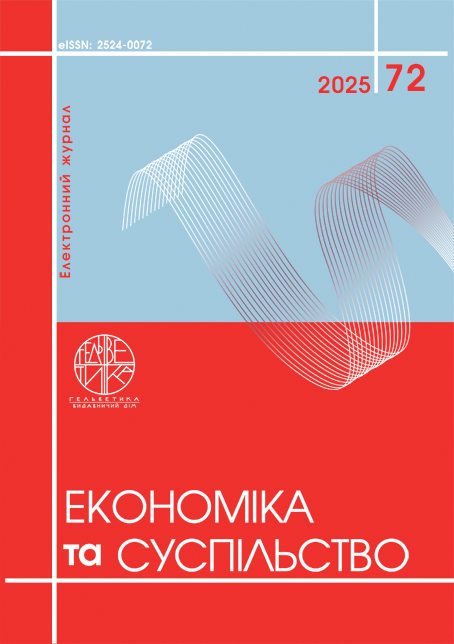DIGITAL ASSETS IN THE STRUCTURE OF INTERNATIONAL RESERVES: ECONOMIC FEASIBILITY AND RISKS
Abstract
This study examines the potential role of cryptocurrencies in national reserves, emphasizing their economic significance and impact on financial stability. The relevance of the topic is determined by the increasing interest of governments and central banks in digital assets as alternative reserve instruments. The research aims to assess the feasibility of integrating cryptocurrencies into sovereign reserves, considering their advantages and associated risks. The study employs a combination of qualitative and quantitative research methods, including comparative analysis, statistical evaluation, and economic modeling. These approaches allow for an objective assessment of cryptocurrency volatility, liquidity, and their ability to serve as a hedge against inflation and monetary instability. The methodology also includes an examination of regulatory frameworks and policy strategies aimed at integrating digital assets into national financial systems. The results demonstrate that while cryptocurrencies offer potential benefits in terms of diversification and financial independence, their high volatility and lack of standardized regulation pose significant challenges to their adoption as full-fledged reserve assets. The study identifies key economic and legal barriers that hinder the widespread use of digital assets in national reserves while highlighting potential mechanisms for mitigating risks. The findings suggest that digital currencies could complement traditional reserves under specific conditions, such as enhanced market maturity, improved risk management, and a clear regulatory environment. The practical significance of the study lies in providing insights for policymakers, central banks, and financial institutions regarding the viability of cryptocurrencies as reserve assets. The research contributes to the ongoing debate on monetary policy innovation, financial sovereignty, and the future of digital assets in global economic systems. The study underscores the need for comprehensive legal frameworks and institutional strategies to facilitate the safe and efficient adoption of cryptocurrencies in national reserves.
References
Bose N., Ward J., Shakil I. Трамп підписує указ про створення стратегічного біткоїн-резерву [Електронний ресурс] // Reuters. – 2025. – URL: https://www.reuters.com/technology/trump-signs-order-establish-strategic-bitcoin-reserve-white-house-crypto-czar-2025-03-07/ (дата звернення: 05.03.2025).
Chalamish E. Центральні банки та суверенні фонди збільшують крипторезерви [Електронний ресурс] // Global Finance. – 2024. – URL: https://gfmag.com/technology/central-banks-sovereign-funds-grow-cryptocurrency-reserves/ (дата звернення: 12.02.2025).
Cingari P. Лагард натякає на подальше зниження ставок ЄЦБ, виключає резерви в біткоїнах [Електронний ресурс] // Euronews. – 2025. – URL: https://www.euronews.com/business/2025/01/30/lagarde-hints-at-further-ecb-rate-cuts-rules-out-bitcoin-reserves (дата звернення: 13.02.2025).
Ferranti M. Хеджування санкційних ризиків: криптовалюта в резервах центрального банку [Електронний ресурс]. – Кембридж (Массачусетс): Гарвардський університет, факультет економіки, 2022. – 64 с. – URL: https://a51.nl/sites/default/files/pdf/Cryptocurrency_in_Central_Bank_Reserves.pdf (дата звернення: 15.02.2025).
Ferranti M. Біткоїн як резервний актив [Електронний ресурс] // Bitcoin Policy Institute. – 2024. – URL: https://www.btcpolicy.org/articles/the-case-for-bitcoin-as-a-reserve-asset-2 (дата звернення: 20.02.2025).
Feyen E., Klingebiel D., Ruiz M. Чи можуть криптоактиви відігравати роль у портфелі валютних резервів? Не сьогодні і, ймовірно, не в найближчому майбутньому [Електронний ресурс]. – Вашингтон, округ Колумбія: Світовий банк, 2024. – 33 с. – URL: https://documents1.worldbank.org/curated/en/099553102232444409/pdf/IDU1c16366af173fa148931a28b189e8eca412f3.pdf (дата звернення: 20.02.2025).
International Monetary Fund. IMF Executive Board Concludes 2021 Article IV Consultation with El Salvador [Електронний ресурс] // Прес-реліз №22/13, 25 січня 2022 р. – URL: https://www.imf.org/en/News/Articles/2022/01/25/pr2213-el-salvador-imf-executive-board-concludes-2021-article-iv-consultation (дата звернення: 28.01.2025).
Monetary Authority of Singapore. Політика цифрових активів та майбутнє фінансової стійкості [Електронний ресурс] // MAS (Monetary Authority of Singapore). – 2024. – URL: https://www.mas.gov.sg/news-and-publications/speeches-and-monetary-policy-statements (дата звернення: 28.01.2025).
Bank Indonesia. Оцінка криптовалют як потенційного резервного активу [Електронний ресурс] // Bank Indonesia Research Papers. – 2023. – URL: https://www.bi.go.id/en/publikasi/Pages/crypto-assets-reserve-assessment.aspx (дата звернення: 01.03.2025).
Moore W., Stephen J. Чи повинні криптовалюти входити до складу міжнародних резервів центральних банків? // Cogent Economics & Finance. – 2016. – Т. 4, №1. – С. 1–12. – DOI: 10.1080/23322039.2016.1147119.
Bose N., Ward J., Shakil I. Trump signs order to establish strategic Bitcoin reserve [Electronic resource] // Reuters. – 2025. – URL: https://www.reuters.com/technology/trump-signs-order-establish-strategic-bitcoin-reserve-white-house-crypto-czar-2025-03-07/ (Accessed: 05.03.2025).
Chalamish E. Central banks and sovereign funds increase crypto reserves [Electronic resource] // Global Finance. – 2024. – URL: https://gfmag.com/technology/central-banks-sovereign-funds-grow-cryptocurrency-reserves/ (Accessed: 12.02.2025).
Cingari P. Lagarde hints at further ECB rate cuts, rules out Bitcoin reserves [Electronic resource] // Euronews. – 2025. – URL: https://www.euronews.com/business/2025/01/30/lagarde-hints-at-further-ecb-rate-cuts-rules-out-bitcoin-reserves (Accessed: 13.02.2025).
Ferranti M. Hedging sanctions risk: Cryptocurrency in central bank reserves [Electronic resource]. – Cambridge (Massachusetts): Harvard University, Department of Economics, 2022. – 64 p. – URL: https://a51.nl/sites/default/files/pdf/Cryptocurrency_in_Central_Bank_Reserves.pdf (Accessed: 15.02.2025).
Ferranti M. Bitcoin as a reserve asset [Electronic resource] // Bitcoin Policy Institute. – 2024. – URL: https://www.btcpolicy.org/articles/the-case-for-bitcoin-as-a-reserve-asset-2 (Accessed: 20.02.2025).
Feyen E., Klingebiel D., Ruiz M. Can crypto-assets play a role in foreign reserve portfolios? Not today, and likely not in the near future [Electronic resource]. – Washington, D.C.: World Bank, 2024. – 33 p. – URL: https://documents1.worldbank.org/curated/en/099553102232444409/pdf/IDU1c16366af173fa148931a28b189e8eca412f3.pdf (Accessed: 20.02.2025).
International Monetary Fund. IMF Executive Board Concludes 2021 Article IV Consultation with El Salvador [Electronic resource] // Press Release No. 22/13, January 25, 2022. – URL: https://www.imf.org/en/News/Articles/2022/01/25/pr2213-el-salvador-imf-executive-board-concludes-2021-article-iv-consultation (Accessed: 28.01.2025).
Monetary Authority of Singapore. Policy on digital assets and the future of financial stability [Electronic resource] // MAS (Monetary Authority of Singapore). – 2024. – URL: https://www.mas.gov.sg/news-and-publications/speeches-and-monetary-policy-statements (Accessed: 28.01.2025).
Bank Indonesia. Evaluation of cryptocurrencies as potential reserve assets [Electronic resource] // Bank Indonesia Research Papers. – 2023. – URL: https://www.bi.go.id/en/publikasi/Pages/crypto-assets-reserve-assessment.aspx (Accessed: 01.03.2025).
Moore W., Stephen J. Should cryptocurrencies be included in the portfolio of international reserves held by central banks? // Cogent Economics & Finance. – 2016. – Vol. 4, No.1. – P. 1–12. – DOI: 10.1080/23322039.2016.1147119.

This work is licensed under a Creative Commons Attribution 4.0 International License.


